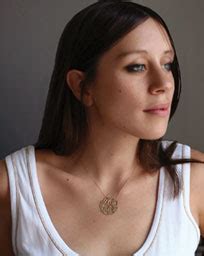A Quote by Edith Wharton
Little as she was addicted to solitude, there had come to be moments when it seemed a welcome escape from the empty noises of her life.
Related Quotes
Before her marriage she had thought that she had love within her grasp; but since the happiness which she had expected this love to bring her hadn’t come, she supposed she must have been mistaken. And Emma tried to imagine just what was meant, in life, by the words “bliss,” “passion,” and “rapture” - words that had seemed so beautiful to her in books.
She felt so old, so worn out, so far away from the best moments of her life that she even yearned for those that she remembered as the worst… Her heart of compressed ash, which had resisted the most telling blows of daily reality without strain, fell apart with the first waves of nostalgia. The need to feel sad was becoming a vice as the years eroded her. She became human in her solitude.
[Keeping kosher was] the symbol of an initiation, like the insignia of a secret brotherhood, that set her apart and gave her freedom and dignity. Every law whose yoke she accepted willingly seemed to add to her freedom: she herself had chosen . . . To enter that brotherhood. Her Judaism was no longer a stigma, a meaningless accident of birth from which she could escape . . . It had become a distinction, the essence of her self-hood, what she was, what she wanted to be, not merely what she happened to be.
She seemed to know, to accept, to welcome her position, the citadel of the family, the strong place that could not be taken. And since old Tom and the children could not know hurt or fear unless she acknowledged hurt or fear, she had practiced denying them in herself. And since, when a joyful thing happened, they looked to see whether joy was on her, it was her habit to build laughter out of inadequate materials....She seemed to know that if she swayed the family shook, and if she ever deeply wavered or despaired the family would fall.
From an early age she had developed the art of being alone and generally preferred her own company to anyone else’s. She read books at enormous speed and judged them entirely on her ability to remove her from her material surroundings. In almost all the unhappiest days of her life she had been able to escape from her own inner world by living temporarily in someone else’s, and on the two or three occasions that she had been too upset to concentrate she had been desolate.
She had come to him to escape her mother's world, a world where all bodies were equal. She had come to him to make her body unique, irreplaceble. But he, too had drawn an equal sign between her and the rest of them: he kissed them all alike, stroked them all alike, made no, absolutely no distiction between Tereza's body and the other bodies. He sent her back to the world she tried to escape, sent to march naked with the other naked women
In Tereza’s eyes, books were the emblems of a secret brotherhood. For she had but a single weapon against the world of crudity surrounding her: the novels. She had read any number of them, from Fielding to Thomas Mann. They not only offered the possibility of an imaginary escape from a life she found unsatisfying; they also had a meaning for her as physical objects: she loved to walk down the street with a book under her arm. It had the same significance for her as an elegant cane from the dandy a century ago. It differentiated her from others.
I took her into bed with me and propped myself up with pillows against the headboard to let her nurse. As she nursed and the milk came, she began a little low contented sort of singing. I would feel milk and love flowing from me to her as once it had flowed to me. It emptied me. As the baby fed, I seemed slowly to grow empty of myself, as if in the presence of that long flow of love even grief could not stand.
Day and night she had drudged and struggled and thrown her soul into her work, and there was not much of her left over for anything else. Being human, she suffered from this lack and did what she could to make up for it. If she passed the evening bent over a table in the library and later declared that she had spent that time playing cards, it was as though she had managed to do both those things. Through the lies, she lived vicariously. The lies doubled the little of her existence that was left over from work and augmented the little rag end of her personal life.
If she had been left alone she would have gone on, in her own way, enjoying herself thoroughly, until people found one day that she had turned imperceptibly into one of those women who have become old without ever having been middle aged: a little withered, a little acid, hard as nails, sentimentally kindhearted, and addicted to religion or small dogs.
Rage-the biggest, truest rage of her adult life-had invaded her like a fever, but it wasn't like any fever she had known previously. It circulated like weird serum, cold on the right side of her body, then hot on the left, where her heart was. It seemed to come nowhere near her head, which remained clear.






































